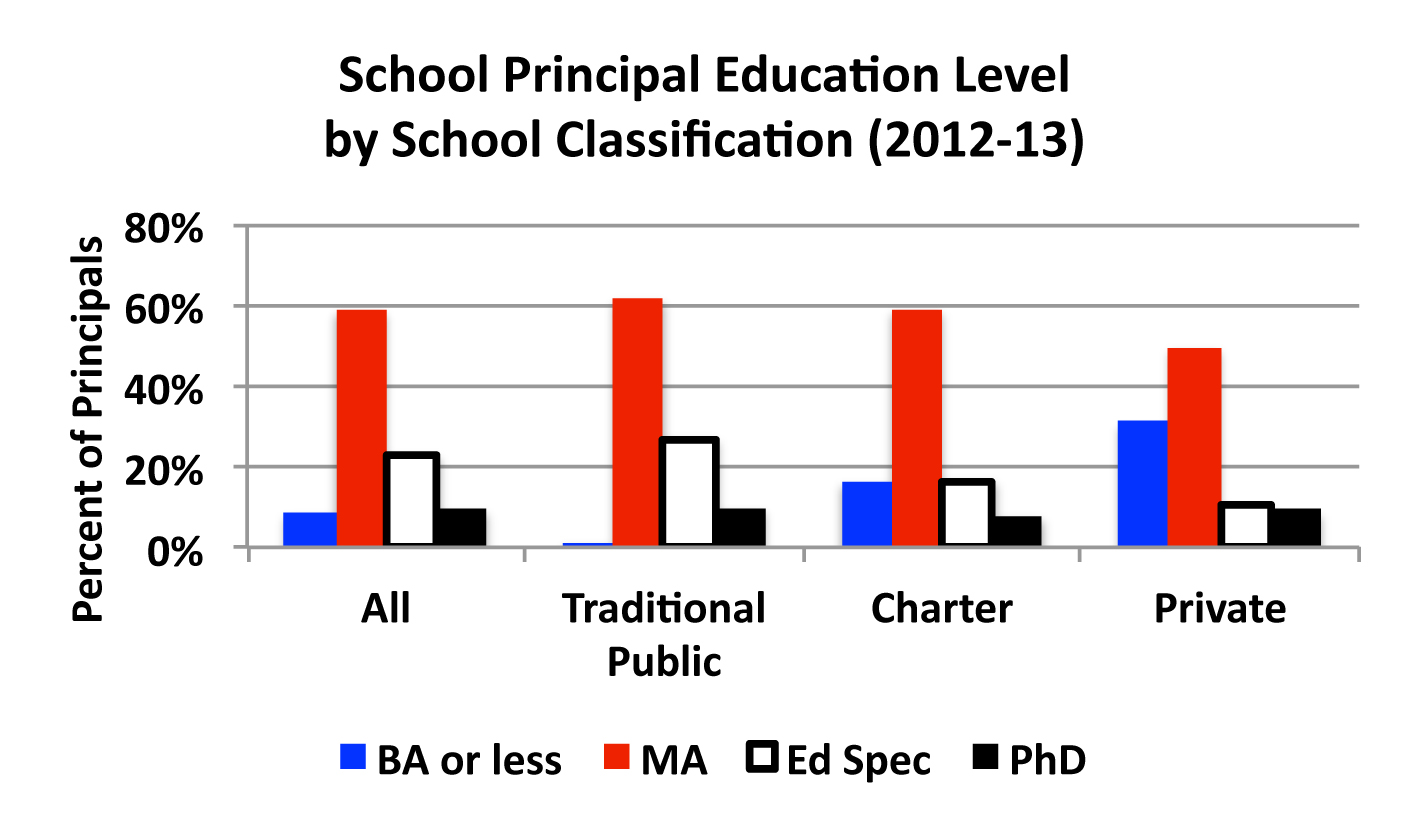What is the postsecondary education level of school principals?
Why is this question important? School principals are the second most important school-related factor, after teachers, in influencing student performance, accounting for about a quarter of total school effects (Marzano, Waters, & McNulty, 2005). There is increasingly clear evidence as to which practices of principals are associated with teaching effectiveness, student achievement, and high-performing schools (Robinson, Lloyd, & Rowe, 2008). It is critically important to identify the most effective practices and impart them to both starting and existing principals. One of the primary development strategies for principals has been attainment of higher education degrees. This analysis describes the extent to which principals earn advanced degrees.
See further discussion below.

BA or less: Bachelor's degree or less
MA: Master's degree
Ed Spec: Education specialist or professional diploma (at least 1 year beyond the master's level)
PhD: Doctorate or first professional degree
Results: During the 2012–13 school year, 98.6% of traditional public schools principals, 83.5% of charter schools principals, and 68.9% of private schools principals had a master's degree or higher.
Overall, the great majority of school principals held advanced degrees; 91.4% had a master's degree or higher.
The largest differences in education levels occurred among school classifications. Private and charter schools had a significantly higher percentage of principals with bachelor's degrees or less (31.0% and 16.5%, respectively) than did traditional public schools (1.4%).
Education level did not vary significantly in relation to many school characteristics, such as community type (city, suburban, town, rural); school level (primary, middle, high, combined); student enrollment; or percentage of students qualifying for free or reduced-price lunches.
Implications: It is clear that one of the most intensive interventions in the professional development of principals is the acquisition of advanced degrees. Research on effectiveness of advanced degrees is difficult to produce, as virtually all principals have these degrees. As far as where principals obtained their degrees, at least one study showed that college selection had no effect on performance (Clark, Martorell, & Rockoff, 2009). Attainment of advanced degrees is an extremely expensive strategy, both in cost and time. It becomes critically important to evaluate the effectiveness of this strategy and ways in which it might be improved.
Study Description: The 2012–13 Principal Follow-up Survey (PFS) is a component of the Schools and Staffing Survey (SASS), a nationally representative sample survey of public and private K–12 schools, principals, and teachers in the 50 states and District of Columbia. The purpose of the SASS is to collect information that can provide a detailed picture of U.S. elementary and secondary schools and their staff. It was developed by the National Center for Education Statistics (NCES) of the Institute of Education Sciences within the U.S. Department of Education and was conducted by the U.S. Census Bureau.
The SASS covers a wide range of topics including teacher demand, teacher and principal characteristics, general conditions in schools, principals' and teachers' perceptions of school climate and problems in their schools, teacher compensation, district hiring and retention practices, and basic characteristics of the student population.
Citation:
Clark, D., Martorell, P., & Rockoff, J. (2009). School principals and school performance. National Center for Analysis of Longitudinal Data in Education Research (Working Paper 38). Washington, DC: Urban Institute.
* Goldring, R., & Taie, S., (2014). Principal attrition and mobility: Results from the 2012–13 principal follow-up survey, first look. (NCES 2014-064). U.S. Department of Education. Washington, DC: National Center for Education Statistics.
Marzano, R. J., Waters, T., & McNulty, B. A. (2005). School leadership that works: From research to results. Alexandria, VA: Association for Supervision and Curriculum Development.
Robinson, V. M. J., Lloyd, C. A., & Rowe, K. J. (2008). The impact of leadership on student outcomes: An analysis of the differential effects of leadership types. Educational Administration Quarterly, 44(5), 635–674.
*study from which graph data were derived
